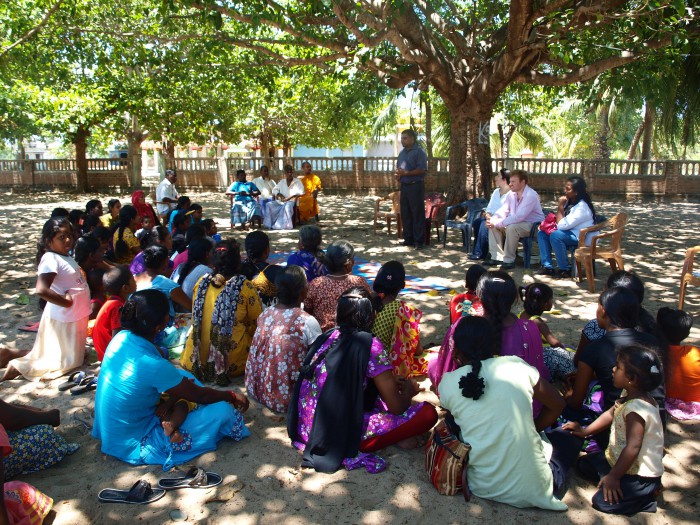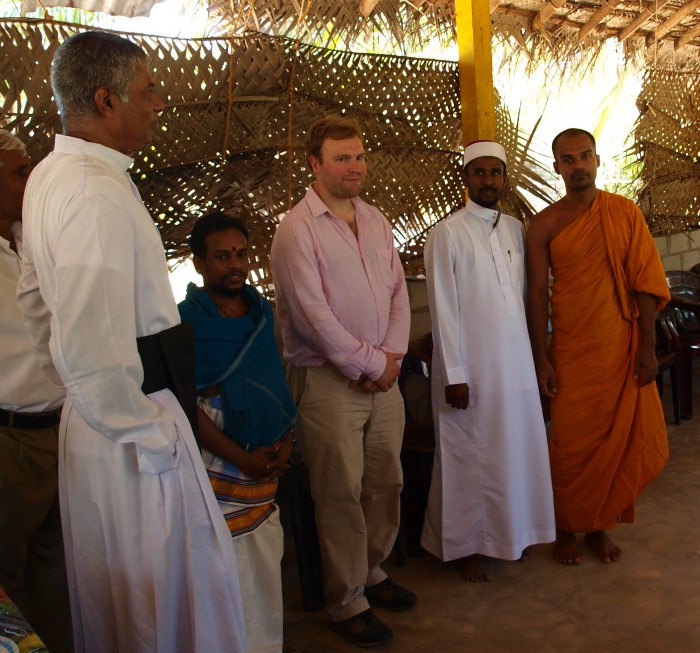6th October 2015 London, UK
FCO Human Rights and Democracy Programme: Promoting Ethno-Religious Harmony in Sri Lanka

Slowly but increasingly surely, Sri Lanka is becoming a human rights success story. This is primarily due to the determination of its people and the courage of its recently elected leaders (see the British High Commission’s blog). But the international community, responding to our Prime Minister’s lead, has played a significant role, including through the UN: the Human Rights Council (HRC) and the investigation it launched. The consensus resolution adopted at this session of the HRC, produced by the US, UK and Sri Lanka working together, is exactly what we mean when we talk, in the abstract, about “strengthening the rules based international system”. For Sri Lankans, we hope, it will bring healing for the past and prosperity for the future.
This week, I’m hosting a guest blog from my department’s communications officer, Dominic Rhodes, who went out to Sri Lanka to help support the High Commission before the parliamentary elections. Whilst there, he also visited one of our human rights projects, in the east of the island, to observe work to bring Hindu-Tamil and Muslim communities together.

When thinking of Sri Lanka, most people recall pristine white sandy beaches and azure blue seas along with lush emerald forests and tea plantations. A few may also remember that the country has had a fairly turbulent recent history, with a lengthy civil war and devastating tsunami in 2004. The population is comprised of a mix of ethno-religious groups: around 75% are Sinhalese (mostly Buddhist and Christian), 15% Tamil (mostly Hindu), and around 10% Muslim. The war has led to mistrust between Sinhalese and Tamil groups in particular, although there has also been some tension with Muslim communities.
One of the aims of our Human Rights and Democracy Programme (HRDP) is to promote freedom of religion or belief, as set out in the Universal Declaration of Human Rights (and ICCPR); upholding religious freedom is often a crucial factor in post-conflict peace-building. We focus on countries where we judge that we are best placed to make an impact, such as Sri Lanka, where episodes of religious-based communal violence have been reported since 2013.
The FCO are working with a Sri Lankan NGO called Sevalanka, whose core aim is to improve the lives of disadvantaged communities by encouraging development in a sustainable way. I visited Batticaloa, which was badly affected by both the war and the 2004 tsunami.
Sevalanka are involved in a range of activities to promote inter-faith cooperation, from a national symposium through to workshops, conflict mapping and religious dialogue. They are also working online, including through social media, to promote more tolerant values.
First on the agenda was a meeting at Sevalanka’s local HQ with both youth and religious leaders involved in the project. It was fascinating to hear from young men and women who had participated in an inter-district exchange programme, which offered a chance for young people to stay with a family from a different ethno-religious group. By staying in a family home rather than a hotel, there is greater opportunity to be fully exposed to a different culture (plus it is a lot cheaper!). They were also enthusiastic about the forum-theatre that had been put on in communities to explore themes of tolerance.
A short bus ride away, I had the chance to meet inhabitants of a mixed Muslim-Hindu village at a midday town-hall style meeting, thankfully in the shade of a grand old tree. Both young and old, men and women were clear that no one wanted to a return to conflict. Whilst there would be disagreements and misunderstandings, the community had to find ways to resolve these in an amicable way. They were grateful to Sevalanka who had organised meetings to address any areas of dispute – the community had too few resources to do this on their own.
Next stop was a courtesy call on the district government representative. I congratulated her on Sri Lanka’s recent peaceful election before turning to the issue of ethno-religious conflict. She set out the steps that the government were taking, which included the development of roads so that communities would be less isolated and work to identify areas of tension so issues could be nipped in the bud. There was also a government scholarship scheme which provided an opportunity for those from less-wealthy families to secure a place at university. I agreed this was important; lack of prospects for young people could lead to immense frustration. Finally, she said that the government understood that the international community would not be handing Sri Lanka a blank cheque to tackle these issues; what they valued more than most was our experience of how to move on post-conflict, including what the UK had learned in Northern Ireland.
The last item on the agenda was attendance at an inter-community cricket match. If there’s one thing that unites the island above everything else it is cricket – a recent defeat of India and the final test match of a Sri Lankan cricketing legend had underlined this fact. The positive impact on these communities was clear; young people were meeting and making friends with people from different backgrounds, thus building understanding between ethno-religious groups.
It was great to see first-hand the excellent work being done by one of our HRDP implementers, and this model of building communities could be replicated elsewhere. Developed countries are not immune from discrimination against individuals on the basis of their religion or belief, and in Europe the current refugee crisis may well exacerbate previous tensions. Freedom of religion or belief may well be the defining human rights challenge of the early 21st century.


Thank you. İ visiting your blog . Nice a comments Thanks for your helpful article. Right on. It’s more informative and easy to understand. Thanks a lot such a nice guideline.
Excellent read ,I think this site holds very wonderful composed subject material posts. Thanks for the article. I thoroughly enjoyed reading it and I was very interested in what you have to say! I am mainly involved with forex trading but I really got a lot from this.Great article with great information!! Keep up the posting and keep up the great work
Excellent read ,I think this site holds very wonderful composed subject material posts. Thanks for the article. I thoroughly enjoyed reading it and I was very interested in what you have to say! I am mainly involved with forex trading but I really got a lot from this.Great article with great information!! Keep up the posting and keep up the great work
Thank you. İ visiting your blog . Nice a comments Thanks for your helpful article. Right on. It’s more informative and easy to understand. Thanks a lot such a nice guideline.
Many thanks for your comment.